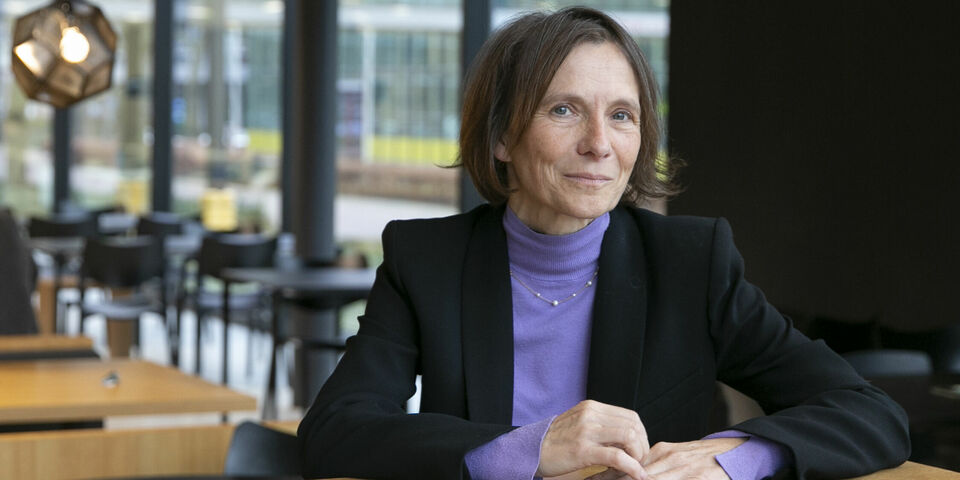“I want to make a stand for young female talent”
The announcement in January that she would be moving from the University of Antwerp to TU/e in the position of rector was met with many positive reactions. As such, Silvia Lenaerts, who will take over from Frank Baaijens tomorrow, feels honored to start working here. She wants to encourage young people, and talented women in particular, to pursue a technical study program. Lenaerts: “Talent should be allowed to flourish, regardless of background, gender or social circumstances.”
Tomorrow, Silvia Lenaerts will assume her position at TU/e as the first female rector at a Dutch technical university. This was announced in mid-January, but due to her busy schedule with the handover and the conclusion of her work in Antwerp, it was not possible to schedule a face-to-face interview with Cursor before May 11. However, she does answer some of the questions we would have liked to ask on that occasion below. An appointment for an on-campus interview will be made soon.
Choosing a rector who does not come from within the university’s own ranks is an unusual step for TU/e. Were you aware of that and if so, did it add any extra tension in accepting this position as an “outsider”? What was the main reason why you accepted the job?
Silvia Lenaerts: “I feel deeply honored to take up this position. TU/e and Brainport were already very familiar to me. I especially like the academic context with young people who are in an important phase of their lives. What appeals to me as well is the fact that it’s a technical university, with engineers who are solution-oriented.
And, of course, the city of Eindhoven, where I often visited as a teenager because my father used to work here at the Philips Institute for Manual Medicine as a physiotherapist, and it was the closest city for me back in my younger years.”
You will be the first female rector at a technical university in the Netherlands. This has been known for some time now. Were there any special reactions to that fact? How does the outside world respond to it?
“I was pleasantly surprised with the incredible number of positive reactions. It shocks me that I’m still the first woman, and I will work hard to inspire more women to assume responsible positions too. When I started working after graduating in Chemistry, I was the first woman. Throughout my career, I’ve often been the first or only woman. And now, once again.
It’s a great shame that there are young women out there who don’t pursue a technical program even though they have the talent for it. I want to make a stand for them, but also for other young people whom we’re currently not reaching well enough. Young people who, for various reasons, have difficulty finding their way into academic education. Talent should be allowed to flourish, regardless of background, gender or social circumstances.”
Challenge-Based Learning (CBL) is an integral part of the new Bachelor College 2.0. What are your views on this educational concept?
“I think it’s important to be able to safeguard the diversity of profiles. Both in-depth technical knowledge and education driven by social challenges can be an important added value for young people. Engaging in CBL also allows students to explore other aspects of the challenges we face as a society.
Our student teams are a great and successful example of CBL. Looking at what they achieve in a relatively short period of time and the innovative solutions they come up with to current global challenges, the university can be very proud of them.”
In recent years, TU/e has brought together research conducted in certain subject areas in four research institutes. This is intended to stimulate multidisciplinary collaboration even more. Do you think this is the correct approach and if so, why? Do you think there are other ways to encourage this multidisciplinary collaboration?
“I think that in addition to the in-depth fundamentals, fundamental and applied research, there should also be room for multidisciplinary research. As Chair of IMDO at UAntwerp, I have experience with institutes. I like the fact that this allows the interdepartmental ties to grow even stronger.”
Increasing work pressure and the great struggle to recruit enough talented lecturers and researchers are two issues that are also high up on the agenda at TU/e. Do you already have any ideas on how to address these?
“Those are indeed two important points that I will be focusing on. Among other things, I think we need to create space so that people won’t be required to cover all aspects but will be able to differentiate more in whatever career path they feel most comfortable in.”
Social safety is a topic of increasing attention at our university as well. What role do you envision for yourself in this regard?
“That is, of course, very important; social safety within the work and study environment is high up on my agenda. People should feel comfortable and safe so that they like coming to work. As a university, you should pay attention to that. After all, our university revolves around people: around students, researchers, employees and all others who are connected to us one way or another. Every one of them deserves a safe and positive environment to work and study in. We all share responsibility for that.”
An introductory interview with Silvia Lenaertswas posted on theTU/e website in late January.


Discussion